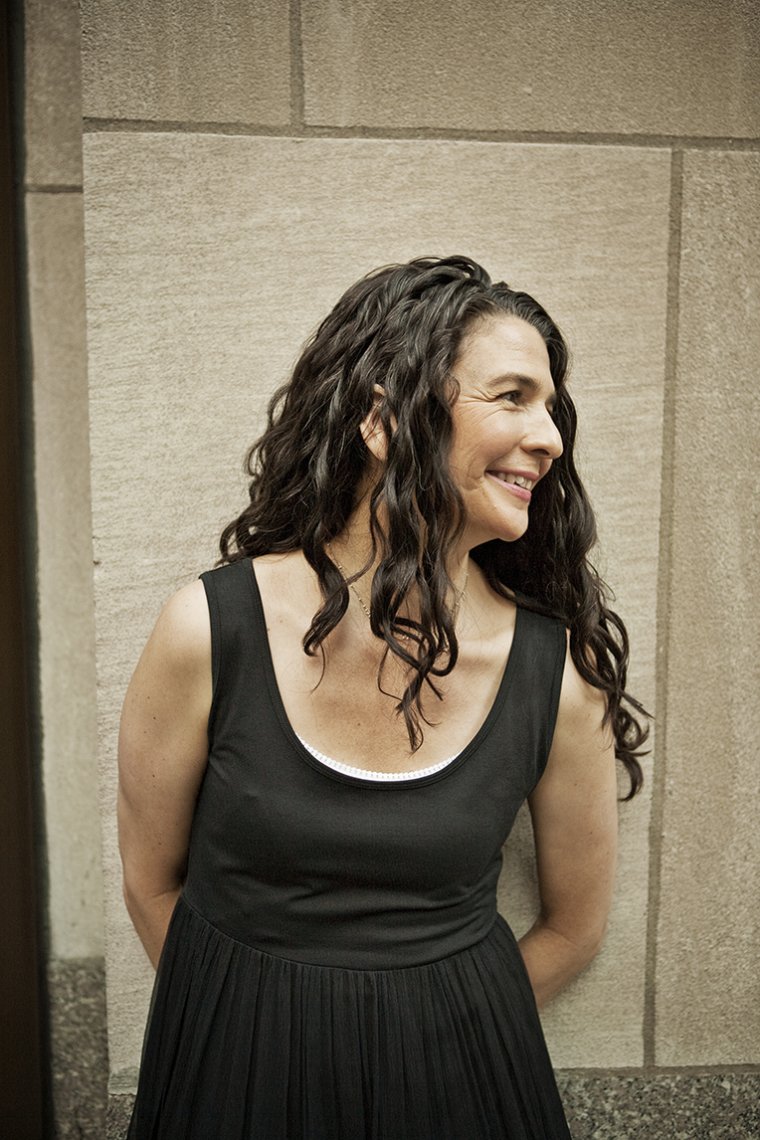Eight years after the car accident in San Antonio—eight years during which she remained unaware of her face blindness as well as her mother’s mental illness—Sellers had another one of those experiences when it felt like God hit her over the head. “I think everyone has one day like this, and some people have more than one,” Sellers writes in her memoir. “It’s the day of the accident, the midlife crisis, the breakdown, the meltdown, the walkout, the sellout, the giving up, giving away, or giving in. The day you stop drinking, or the day you start. The day you know things will never be the same again.”

It was 2002, and Ahsahta Press had just released Sellers’s first poetry collection, Drinking Girls and Their Dresses. (The first line in the book is “We are frantic families here.”) Still teaching at Hope College, Sellers was fitting in a little better in Holland than she had in San Antonio. For one thing, she was dating someone. Sellers had been seeing Dave—a man who had had to leave his first wife, a severely disabled schizophrenic, in order to keep his two teenage sons—for a couple years, and he and his sons already felt like family to her. So Sellers decided to take them to Florida to meet her mother and father.
The trip provides the entry point for the memoir, in which Sellers describes arriving in Orlando to find her father, who had suffered a stroke seven years earlier, in bad shape. (“He looked like he was a pile of pieces of a man,” she writes.) Her mother was nervous, unchanged—the windows nailed shut, the house shrouded in darkness. Still, Sellers was determined to introduce them to the man she planned to marry. (Later that year, in fact, they became husband and wife; but within two years they were divorced, and now remain friends.) Only a few minutes into the introductions, however, her mother inquired about Dave’s ex-wife and, after learning the details, wouldn’t allow Dave and his sons to stay in her house. In the memoir, Sellers describes the anxious scene:
“I told Dave I will pay for a room at the Jamaica Palms,” my mother was saying. “Can’t we just have a nice time together? Please? I have looked forward to your coming for so long! But honey, I can’t have your lifestyle in my house. I wasn’t raised like that. I didn’t raise you to flaunt—”
The Jamaica Palms motel was next to the razed gas station. The rooms were rented by the hour, had been for years. The pool was filled with trash bags and broken glass.
“I told them you wanted to be a grandma. I told them you love kids.”
“I wish people would stop using that word!” She clasped her gray, veiny hands to her ears. “I can’t take this!”
Dave and the boys cut their trip short and returned to Michigan, but Sellers stayed in Orlando to give a reading from Georgia Under Water and to attend her twentieth high school reunion. As she stood on the periphery of the party, watching strangers she had once called classmates (Sellers admits she had not been one of the popular kids: “I was so on the outside, you know, desperately bored, dressed weirdly, couldn’t interact, didn’t know who the hell I was talking to”), an ex-boyfriend spotted her. While they were chatting—catching up in that superficial way two people who were once close but are now separated by equal parts time, experience, and regret typically regard each other—he offhandedly asked, “What was up with your mother? What was she, paranoid schizophrenic?”
“And I thought, ‘God, what an asshole,’” Sellers recalls. “‘Asshole then, asshole now.’ What a mean thing to say. But afterward, driving back to my mother’s house where all the windows are locked and there are drapes over the doors—she won’t let me in, all this crazy stuff—there was like a rent in the fabric. I thought, ‘Oh God, maybe I knew this all along.’” And yet she still found it hard to believe that her mother was mentally ill. “Schizophrenics were like Dave’s first wife,” she writes in the memoir. “They were locked away, they were on meds, they were crazy, crazy people. My mom was peculiar. It was not possible for me to be thirty-eight years old and not to have known my mother was a paranoid schizophrenic.”
Rattled, Sellers returned to Michigan and immediately went to a bookstore and researched paranoid schizophrenics to find out if her mother exhibited any of their characteristic symptoms—seeing things that aren’t there, hearing things that no one else hears—to try and put an end to the creeping suspicion that she herself was crazy. Paging from one textbook to the next she took it all in and realized that her mother fit the descriptions she’d been reading. Then she came across a passage that contained two very simple yet, for her, life-altering words. What started out as a search for a better understanding of schizophrenia led to her first clue about face blindness. It was the one-two punch that finally woke her up.
The passage explained that schizophrenics had trouble reading emotions. They couldn’t tell what someone was thinking by their facial expression. They couldn’t utilize social cues. Irony was not available to them. I skimmed along until two words brought me to a complete standstill: facial recognition.
I put my fingers on the words and closed the book over my hand. I closed my eyes. The book was talking about emotions on faces, but the phrase itself, face recognition, made it easy to conflate the two concepts: reading emotion and identifying faces. It was as if I’d shaken a kaleidoscope. It was all the same pieces, but suddenly a long sequence of misunderstandings, from when I was very young to just the night before, sprang into light, lined up, crystallized.
It was as though all along I had been someone else, and now I had a glimpse of who was who.
From the twenty-ninth-floor terrace of the Orion, a residential skyscraper in midtown Manhattan, Heather Sellers has an unobstructed view of the entire length of the metropolis—to the south, the Statue of Liberty; to the north, Central Park and beyond. It is late summer in the city, and Sellers is renting a condominium for a monthlong visit, during which she is reveling in the excitement of prepublication marketing and publicity meetings at Riverhead, sitting for the occasional interview, and embarking on daylong excursions to popular sights in what she calls her “adopted hometown.”
As we talk on the sun-splashed terrace high above West 42nd Street, Sellers, whose mane of black hair keeps blowing up and down and across her face in the warm wind sweeping over the Hudson River, appears perfectly and beautifully at ease. She’s in her element up here among the soaring facades of New York City. It’s not what you might expect from a writer who lives in a small town, whose literary work up until now has been published only by small presses, and who is about to publish a revealing memoir about her mother’s mental illness and her own neurological disorder. The fact that she also just faced the challenge of meeting me in the lobby of her building without being able to rely on identifying facial features adds to an air of almost preternatural calm. (She jokes, however, that I was the only man sitting in the lobby, and therefore a pretty safe bet, and that after our brief walk to the elevator she will be forever able to recognize me by my gait, a comment that swiftly and efficiently turns the tables, leaving me the self-conscious one.)
As for any accompanying anxiety about publishing her memoir, Sellers is unequivocal. “I had to tell this story; there’s no way I’m not going to tell it. I knew a couple of weeks after I came across that phrase in the bookstore—that dramatic life-changing moment—I knew I’d be writing about it. It’s the gift a writer waits for her whole life.”
Sellers first wrote about her face blindness in an essay, published in the Fall/Winter 2006 issue of Alaska Quarterly Review, in which she describes the MRIs she underwent at Harvard University after she did more research and discovered that prosopagnosia exists. She goes on to explain that, though she finally had a diagnosis, it really only amounted to a fancy name, a label, and since there is no cure for face blindness, nothing really changed. “I am a girl steering a brain,” Sellers writes, “flying through space, like a neuron, with a destination, and a heart, and I’m still wondering. What do I know now?”
After the essay was published and later reprinted in the first volume of The Best Creative Nonfiction (Norton, 2007), edited by Lee Gutkind, it attracted the attention of several agents eager to see a book-length manuscript. The one to whom she felt a connection—the only one she met in person—was Chuck Verrill of Darhansoff, Verrill, Feldman. “I just kind of fell in love with him,” Sellers recalls. “I think you have to meet [an agent] in person. I didn’t really ask him about his connections or the selling or anything. We talked about our families and he got what I’m trying to do with family—to show how love for these incredibly flawed people sneaks in—and he just got that, and it was so moving to me, I chose him because of that.”
Verrill and another agent at the same agency, Michele Mortimer, helped Sellers edit the manuscript (initially written as a series of linked essays), and courted several publishers for offers, but the author eventually signed a deal with Rebecca Saletan, the editorial director of Riverhead Books. “I had offers from other publishers but I felt like all of them wanted it to be a kind of topic book, like maybe at the end there would be a ‘Guide to Living With Face Blindness,’ which I would be incapable of writing,” Sellers says.
At Riverhead, Saletan gave the memoir what she calls “a haircut,” trimming about a hundred pages and helping to braid the two strands that run through the book—the face blindness and the story of her family. The thematic link between those two strands, Saletan says, is what drew her to the memoir.
“There’s a relationship between the way in which face-blind people compensate for living with great uncertainty by taking their clues from surroundings, basically figuring out from context whom it is they’re talking to,” Saletan says. “And I thought there was a connection between that and the way she comes to terms with her past—that one of the ways we make our peace with the past is by seeing it in context. So even with these very problematic parents, this very dysfunctional family, she was able to see them in the broader sense of what they were, to see the demons they themselves were wrestling with.”
It would be a mistake to read You Don’t Look Like Anyone I Know in search of a thorough understanding of prosopagnosia (for that rather more clinical approach, one might look to Dr. Sacks), because what Sellers delivers is her personal take on living with the disorder—a decidedly uncertain, honest, and therefore realistic human story. Apart from waking up, finally, after so many years, to the reality of her face blindness, there is no satisfyingly simple resolution, no bow to tie around the final pages. Nor does Sellers strive for some kind of fanciful family-reunion scene to close out the narrative of her parents. Instead, Sellers does the only things that are in her power to do. She acknowledges the disorder. She forgives her parents.
Both of Sellers’s parents, now eighty, are suffering from dementia—her father, who suffered a second stroke, is in a nursing home, and her mother, whom Sellers describes as “very, very ill,” is in a care facility in Florida. While she is not in touch with her mother, Sellers recently set her father up with Skype so the two could talk regularly.
“It’s amazing to see him. I love him so much,” she says over the phone, a few hours after talking with him for the first time using the videoconferencing software. “He was this cross-dressing alcoholic, a really disturbed person. He was violent and abusive in so many ways, but I love him. It’s just so great to see him.
“I showed him the cover of the new book and I said, ‘I wrote about you, how do you feel?’ and he said, ‘Good, good, good, good, you should write.’ And I asked him, ‘Do you think it’s okay for everyone to write anything they want?’ And he was like, ‘Absolutely.’ I don’t know if he knows what he’s saying, but it made me really happy.”
Kevin Larimer is the editor of Poets & Writers Magazine.








